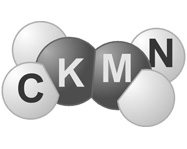Avondlezing door dr. Stephan Hacker georganiseerd door de Chemische Kring Midden Nederland.
Samenvatting
The potency and selectivity offered by covalent inhibitors have led to a resurgence of their application in drug discovery.[1] In this context, modern residue-specific chemoproteomic approaches allow the highly parallel profiling of the ligandability of whole proteomes with resolution of the targeted amino acid.[2],[3],[4] This enables the simultaneous identification of many new ligandable binding sites in potential target proteins for therapeutic intervention alongside first ligands to interrogate their function.
Our group is developing covalent inhibitors in the context of antibiotics, because new druggable antibacterial targets are urgently needed to overcome bacterial resistance.[5] We have developed a tailored method for residue-specific chemoproteomics in bacteria that we term isoDTB-ABPP.2 We have applied this technology for the screening of cysteine-directed ligands in S. aureus and identified >250 binding sites that can be addressed with covalent ligands and that are starting points for the development of novel antibiotics.
Furthermore, we are developing new chemotypes to globally investigate a variety of other amino acids. Here, we have recently profiled more than 50 electrophilic alkyne probes for their proteome-wide reactivity and selectivity[6] and identified first‑in‑class probes to globally study aspartates and glutamates[7] as well as arginines, histidines and tryptophans in the proteome.6 These studies will help us to identify a plethora of new druggable bacterial targets that can be addressed with novel antibiotics..
Curriculum vitae Dr. Stephan Hacker performed his PhD studies with Prof. Andreas Marx at the University of Konstanz, Germany, and his postdoctoral research with Prof. Benjamin Cravatt at The Scripps Research Institute in La Jolla, USA. Afterwards, he moved to the Technical University of Munich, Germany, to work as an independent group leader. Recently, he became an Assistant Professor at the Leiden Institute of Chemistry. Stephan Hacker’s group develops chemistries for novel covalent protein ligands targeting diverse amino acids as well as chemoproteomic technologies to study their target engagement with resolution of the modified amino acid residue in proteome-wide studies. His group focuses on the application of these compounds and technologies to identify new druggable target proteins in bacteria.
Dr. Stephan Hacker performed his PhD studies with Prof. Andreas Marx at the University of Konstanz, Germany, and his postdoctoral research with Prof. Benjamin Cravatt at The Scripps Research Institute in La Jolla, USA. Afterwards, he moved to the Technical University of Munich, Germany, to work as an independent group leader. Recently, he became an Assistant Professor at the Leiden Institute of Chemistry. Stephan Hacker’s group develops chemistries for novel covalent protein ligands targeting diverse amino acids as well as chemoproteomic technologies to study their target engagement with resolution of the modified amino acid residue in proteome-wide studies. His group focuses on the application of these compounds and technologies to identify new druggable target proteins in bacteria.
[1] J. Singh et al. (2011) Nat. Rev. Drug. Discov. 10, 307-317.
[2] P. R. A. Zanon et al. (2020) Angew. Chem. Int. Ed. 59, 2829-2836.
[3] K. M. Backus et al. (2016) Nature 534, 570-574.
[4] S. M. Hacker et al. (2017) Nature Chem. 9, 1181-1190.
[5] M. Lakemeyer et al. (2018) Angew. Chem. Int. Ed. 57, 14440-14475.
[6] P. R. A. Zanon et al. (2021) ChemRxiv, doi: 10.33774/chemrxiv-2021-w7rss-v2.
[7] K. Bach et al. (2020) ACS Cent. Sci. 6, 546-554.
Introducé(e)s zijn van harte welkom.
Graag vooraf bericht als u verwacht te komen.
Stuur daartoe een mail naar chemdorpjwj@hotmail.com

